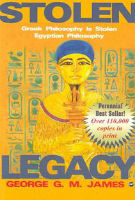Stolen Legacy: The Egyptian Origins of Western Philosophy, by Dr. George G. M. James, first published in 1954 asserts that Greek philosophy is stolen Egyptian philosophy. The book is an attempt to show that the true authors of Greek philosophy were not Greeks, but the people of North Africa, commonly called the Egyptians; and the praise and honor falsely given to the Greeks for centuries belong to the people of North Africa, and therefore to the African Continent.
Consequently, this theft of the African legacy by the Greeks led to the erroneous world opinion that the African Continent has made no contribution to civilization, and that its people are naturally backward. This is the misrepresentation that has become the basis of race prejudice, which has affected all people of color.
Written during Dr. James tenure at the University of Arkansas, Stolen Legacy: The Egyptian Origins of Western Philosophy raises more thought-provoking questions and uncomfortable questions than it answers. Though many may disagree with James’ findings, his book confirms the words of Solomon, “there is nothing new under the sun.” Truth and wisdom have been in existence since time began. Greek culture learned much from the Egyptians. Alexander the Great and the Ptolemy dynasty were Greek, but they did not disturb the religion or the customs of the Egyptians, and indeed built magnificent new temples for the Egyptian gods. Ptolemy I, perhaps with advice from Demetrius of Phalerum, founded the Museum and Library of Alexandria, a key academic, literary, and scientific center that drew the top Greek scholars.
In “Stolen Legacy: The Egyptian Origins of Western Philosophy,” James shows how famous Greek philosophers such as Socrates, Plato, and Aristotle were heavily influenced by Egyptian culture, and how many of their teachings were what they had learned from the Egyptians.
Review of Stolen Legacy by Sacred Fire
Stolen Legacy stands among the first scholarly works that have attempted to recover the ‘lost’ history of early African civilization. George G. M. James was a professor of Latin, Greek and mathematics. It was his interest in the roots of Greek philosophy and the seemingly ‘immaculate conception of Western civilization’ that brought him to ask such questions a Who were the Greek Scholars? Who were their teachers? How did what they learned fit into the contemporary Greek worldview? And when James considered the fates of the greatest of them–Anaxagoras was imprisoned and exiled, Socrates executed, Plato sold into slavery and Aristotles exiled–he wondered why they were considered to be undesirable citizens in their own land… Stolen Legacy argues that Greek philosophers were not the originator of Greek philosophy, but they derived it from Egyptian priests..” –Sacred Fire.
To read the book online, click here.
Submit your review | |




1 comment
I personally read this entire book and I have learned from the information.